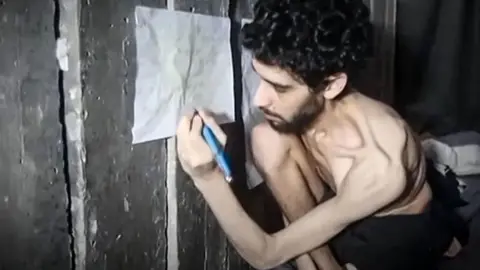In a recent report by BBC News, the anguish of an Israeli family has been brought to light following the release of a harrowing video of Evyatar David, a 24-year-old Israeli hostage held by Hamas in Gaza. The video, which was released on Saturday, depicts David in a severely emaciated state, prompting his brother, Ilay David, to label him as a “human skeleton.” Ilay expressed the profound emotional toll this situation has taken on their parents, who have been left “shattered” by the distressing footage.
The video showed Evyatar making shocking claims about his dire conditions, stating, “I haven’t eaten for days… I barely got drinking water.” As he dug what he described as his own grave, the stark reality of his situation became painfully evident to viewers. The footage has been met with widespread condemnation, not only from within Israel but also from western leaders, who expressed outrage at what many are calling a “new form of cruelty.”
Ilay detailed his brother’s horrific condition, stating that Evyatar is suffering extensively, barely able to speak or move, and may soon succumb to starvation. The emotional impact on the family is evident; Ilay revealed that their father struggled to recognize Evyatar’s voice in the video, while their mother had been inconsolable, crying throughout the day. Ilay characterized his brother’s plight as an unprecedented level of cruelty that defines the current situation in Gaza, saying, “It’s the lowest you can get.”
Amidst these personal struggles, the David family and other families of hostages are calling on Israeli Prime Minister Benjamin Netanyahu to prioritize the release of those still being held in Gaza. Reports indicate that Netanyahu might consider expanding military operations, raising fears among hostage families about their loved ones’ safety. Ilay’s desperate plea highlighted the urgency of the situation, urging world leaders to unite their efforts against Hamas to secure the release of the hostages.
The broader context of the conflict is marked by violence on both sides. Since the onset of the war following the Hamas-led attack on October 7, which saw the abduction of around 251 individuals and casualties exceeding 1,200, the humanitarian crisis in Gaza has escalated. As of now, around 50 hostages remain in captivity; of these, it’s believed that 20 are still alive.
Hamas’s armed wing responded to condemnation by denying the allegation of intentional starvation, asserting that hostages receive the same food as the fighters and the residents of Gaza. However, the statements from hostage families and their desperate calls for dietary assistance highlight a grim reality: without intervention, hostages like Evyatar could face dire consequences.
Reports from the Hamas-run health ministry indicate that the humanitarian situation in Gaza deteriorates daily, with nearly 94 deaths reported in just a single day due to ongoing Israeli operations. The blockade and restrictions have led to widespread shortages of essential supplies, and the World Health Organization has warned of a looming famine, emphasizing that malnutrition-related deaths are becoming common.
Leaders from various sectors have urged for an immediate ceasefire and prioritized negotiations to end the ongoing warfare, emphasizing the need to focus on human lives over military objectives. The group Commanders for Israel’s Security, comprising former defense and security officials, has expressed that the conflict has diverged from its initial justifiable intentions. In an open letter to U.S. leaders, these former officials have highlighted the need to pivot away from military solutions towards diplomatic avenues to secure the hostages’ release effectively.
In conclusion, the distressing situation surrounding Evyatar David is a manifestation of the broader humanitarian crisis occurring in Gaza amid the ongoing military conflict. The urgent pleas from his family and the complexities of geopolitical dynamics underline the need for immediate humanitarian actions and international dialogue to alleviate the suffering of hostages and civilian populations affected by this war.












